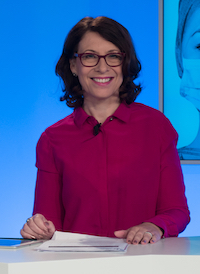
Claire Doole is a former BBC correspondent and international spokeswoman who is passionate about helping people communicate with confidence. Since 2006, she has successfully trained hundreds of professionals in the art of presenting and public speaking, talking to the media, managing communications in a crisis, and writing for the web. In addition, she has coached C-level executives and public figures to give powerful TEDx and TED style talks in Europe and the Middle East. A Swiss and UK national, Claire trains and coaches in French and English.
Claire is also a highly experienced moderator having facilitated panel discussions with government ministers, NGO activists, humanitarians and human rights specialists at major events.
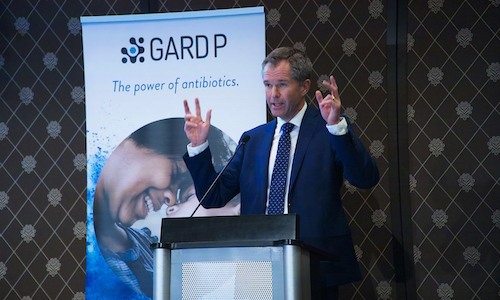
By Claire Doole, www.doolecommunications.com
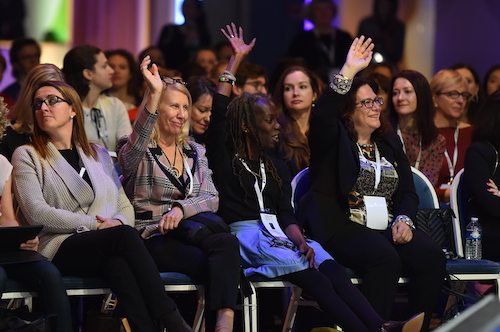
By Claire Doole, www.doolecommunications.com
What is the first thing you think about when asked to give a presentation or speech?
That is a question I often ask in my presenting and speechwriting workshops.
The answers are often very candid but very wrong. They range from the slides I can recycle from previous presentations to structure and messaging.
You can’t give an impactful presentation or speech until you have worked out who you are talking to. Too many speaking engagements are wasted opportunities because the speaker has not tailored his or her content to the audience. If you give some off-the-shelf presentation, audiences know that you are speaking at them and not to them, and will, often, zone out.
You need to ask yourself three questions:
- What does my audience know about the topic of my speech?
- What is their attitude to the topic?
- How big is the audience, and what is the setting?

By Claire Doole, www.doolecommunications.com
Earlier this year I was asked to sit on an interview panel for a Director of Communications position. The organisation requested my support to reduce eight candidates down to four through a series of written and communication tests. I have helped a number of people prepare for job interviews with international organisations and companies, but I had not been in the recruiter’s chair for many years.
It was a great vantage point to assess what works and what doesn’t.
Below are ten observations based on interviewing candidates remotely:
- Prepare. It is a cliché, but preparation does prevent poor performance. I was shocked that some candidates had scant knowledge of the organisation’s vision and mission and had not thought enough about the value they could bring. Employers are looking for what you can do for them: what gaps you can fill and what problems you can solve.
- Don’t over-prepare. One candidate had obviously been privy to some confidential information and revealed it. This did not go down well with the panel.
- Be prepared to answer questions based on your tests and motivation letter. As a side note, make sure that your cover letter is a single page. It should be employer centric and make them want to read your CV. (We received one letter that was 7-pages long – not a good indication of someone’s ability to be clear and concise!)
- Give examples of what you like about the organisation’s mission, values and activities, and where it can improve.
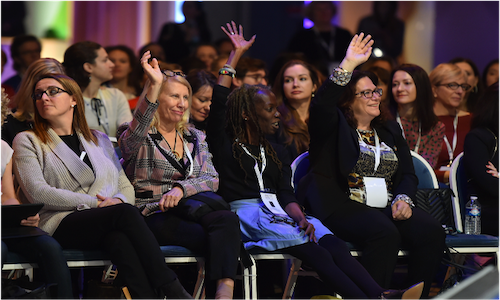
Photo credit: Women's Economy and Society
By Claire Doole, www.doolecommunications.com
Many people I know – both panelists and audience members - are wondering what is the point of panel discussions.
This is what I am told by the senior managers, leaders and experts I have been training in various communication skills.
It seems they are often too promotional, disorganised, lack focus and fail to deliver any new insights or engage the audience. In fact the audience takeaway seems to be at the bottom of the organisers priority list for a successful panel discussion
And ignoring the audience is having consequences as organisers tell me that fewer people are showing up for virtual, hybrid or in-person panels. It would appear that post pandemic we are all suffering from a case of zoomitis and thinking twice before we tune in or turn up to an event.
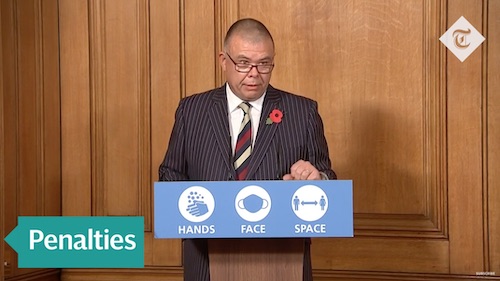
Photo credit: The Telegraph
By Claire Doole, www.doolecommunications.com
What lessons have we learnt from how we communicated on the COVID health crisis that we can apply to the climate crisis?
That has been a recurrent question in some of the panel discussions I have moderated at conferences over the past year.
Two years ago, this month WHO announced a global pandemic. Since then politicians may not have admitted that they got things wrong, but scientists certainly have as this article reveals.
What became increasingly clear is that scientists are comfortable with not having a definitive answer. Being proved wrong lies at the heart of scientific progress.
But the media failed to understand this at first. Editors want certainty and journalists like to give answers. News tends to be black and white, while science is shades of grey.
Julien Pain, producer of the French TV programme, True or False, told me during a panel that “journalists learnt that as science evolves scientists change their mind on issues such as lockdowns, masks, and vaccinating children.”
He said that journalists should have focused on “what we know for sure, what we don’t know and what we need to know”. This he thought would at least have dampened the anti vaxxer arguments about not trusting governments due to their constantly changing policies.
Interestingly, he felt that scientists tended to fall into the trap of playing the media’s game and were not cautious enough with their answers. Perhaps, he opined because they wanted to be on TV or radio.
Latest news
- 1
- 2
- 3
- 4
- 5
- 6
- 7
- 8






